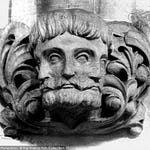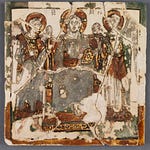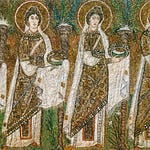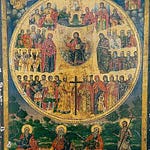A Sermon on Luke 18:1–8
To view the service, check out Trinity’s YouTube channel.
May the words of our mouths and the meditations of our hearts be always acceptable in your sight, O Lord, our strength and our Redeemer. Amen.
It is football season in the South, and it’s a good year for fans of college football in Tennessee—two top-25 ranked teams, Vanderbilt and Tennessee. Vanderbilt beat LSU yesterday, and some people have already celebrated that this morning. Regardless of what happened between Tennessee and Alabama, Tennessee will probably remain a ranked team.
Even though I played football throughout my childhood, I don’t have a team I root for. I like to watch because I enjoy the strategy. My university didn’t have a football team, but when I went to Sewanee—the University of the South and the School of Theology—it didn’t take long for me to hear a story many of you may know: the story of the 1899 Sewanee Tigers, known as the Iron Men.
Sewanee was one of the founding institutions of the predecessor to the Southeastern Conference, and that 1899 football team was famous for a ten-day journey in which they defeated five teams in six days, all by shutout. They beat Texas, Texas A&M, Tulane, Ole Miss, and LSU—and as the story goes, they rested on the seventh day.
It’s been a long time since Sewanee could say anything like that against teams of that size, but back then, the playing field was more even. One of the players on that team was William Sterling Claiborne, who later became Archdeacon of East Tennessee and was instrumental in overseeing and supporting various mission churches—seventeen of them by 1930—supported by what was then Otey Parish, now St. Mark and St. Paul. Many of those congregations still exist in the Sewanee area. He was very much an exemplar of that late-19th- and early-20th-century movement known as muscular Christianity, which also gave us the YMCA and YWCA.
The team was called the Iron Men because they played both offense and defense. They didn’t substitute players. That’s something rarely seen today—usually only when a team has too many injuries to field a full squad or when they’re playing a stronger opponent and want to give themselves a chance by using their best athletes on both sides of the ball. It’s a gamble: can you do enough before you wear out?
You can probably think of times in your life when, if life were a game of football, you felt like you were playing on both offense and defense, with no subs, and maybe even that the refs were out to get you. Imagine then if the referee were not just inept but actually out to get you—odds stacked against you, weary and worn out. In that kind of situation, what a relief it would be to hear another phrase sometimes used about players on a team: “They were all over the field.”
Someone who’s everywhere at once, doing everything.
The hope for us is that God is all over the field in our lives when we face difficulties. And that, I believe, is the message of the parable Jesus tells today.
The Parable of the Widow and the Judge
Luke sets it up for us: Jesus told his disciples a parable “about the need to pray always and not lose heart.” Yet this parable about prayer contains two striking absences. We never hear that the widow prays, and the only reference to God is an unjust judge who “does not fear God.”
So why does Jesus tell us this story about a poor widow under such strain? She’s speaking for herself in the courts—going to the gate of the city. This indicates she has no male relative to stand for her, no brother, son, or nephew. It’s even possible the person she’s seeking justice against is a male relative. She has no advocate, so she goes to the only place she can—the judge—and she goes again and again.
She goes, and he denies her. She goes again, and he denies her.
We know from the start that this is an unjust judge, because he neither fears God nor respects people. That description alone would have told Jesus’ audience that he was a bad judge. In Scripture, the two essential qualifications for a good judge are precisely those: to fear God and to care for people.
Justice, in the biblical sense, requires attention to particular cases and circumstances. There’s even a term from Greek philosophy for this: epieikeia—reasonableness or fittingness. True justice can’t be achieved by applying laws abstractly; it must take account of real people and real situations.
This judge fails completely. Yet the widow persists. She continues to seek what is rightfully hers until she wears him down. Eventually, he relents—not because he’s just, but because she’s relentless.
As Jesus says, the unjust judge relents—she wears him down. In the end, he’s afraid she might come and “give him a black eye.” That’s the literal reading, and just as in English, it has a double meaning. It could mean he’s literally afraid she’ll strike him, or more likely that she’ll damage his reputation. The one thing he cares about—himself—is now at risk because of her persistence, and that’s what finally moves him.
Where God Is Found
Where is God in all this? And where is prayer?
Prayer is found first in the widow’s persistence—the energy and determination that keep her from losing heart. Prayer empowers us in the face of daunting odds. And prayer is not something we generate on our own. It is something God does in us through the power of the Holy Spirit. God inspires prayer—literally breathes it in us. Prayer sustains and directs us, keeps us from despairing, and enables us to do what needs to be done.
Prayer is also present in the parable through the widow’s actions. St. Bonaventure, the medieval theologian, wrote that to “pray always” means prayer of desire in the heart, prayer of petition on the lips, and prayer of disposition in our work and actions. The widow’s desire for justice is prayer in her heart; her appeal to the judge is prayer on her lips; and her persistence in returning again and again is prayer in her actions.
So prayer is there, and God is there.
Sometimes people read this story and wonder where God is in it, but Jesus himself is the one telling the parable—God in the flesh. He sees the plight of people like this widow. He uses her story as an example of faithfulness and persistence. “Look at this widow’s faithfulness,” he’s saying. “She acts despite the odds. You must pray like this if you are not to lose heart.”
This parable comes in response to the disciples’ question about when the Son of Man will come. Jesus’ answer is clear: if you are going to follow me, be faithful. Trust that God is far better than this unjust judge.
It’s what theologians call an argument from lesser to greater: if even the unjust judge eventually relents, how much more will God, who loves us, give what we need?
God is present in the telling of the parable, in the inspiration of the widow’s persistence, and as the ultimate judge who will set things right. While the unjust judge may not fear God, everyone hearing Jesus’ words would know that God will set things right. The Son of Man will return; the question is not if, but when.
And Jesus’ final question lingers: “When the Son of Man comes, will he find faith on earth?”
Will there be people like this persistent widow—faithful, enduring, acting for what is right?
Jesus promises that when God acts on behalf of God’s people, it will happen swiftly. It may appear that nothing is happening, and then suddenly, God’s justice breaks in. Some translations say “quickly,” but others render it “swiftly” or “suddenly”—a reminder that God’s action may seem delayed and then come all at once.
There is hope for the future, yes—but justice also comes through the persistence of God’s people: thousands of widows seeking justice, thousands more who witness their persistence and join them, who refuse to let the unjust rest. Their faithfulness becomes the instrument of God’s justice.
Faith That Persists
In the end, God is all over the field—in our actions, in our prayers, in our endurance, and in our hope.
So what does this mean for us today? For Trinity Church?
You are in a process of transition. Many of you will be called to new things, to new ministries, to take on new responsibilities. You’ll be doing unfamiliar tasks or engaging familiar ones with renewed purpose. In all of it, prayer must remain central—in your heart through desire, on your lips through petition, and in your work through faithful action.
When Christ returns and asks, “Will I find faith on the earth?”—I trust and believe he will find it here at Trinity. Today, next week, and in the years to come, you will be a faithful people empowered by God.
When we pursue justice, when we act faithfully and prayerfully, we are never alone—because God is all over our lives, and all over the field.
Amen.










